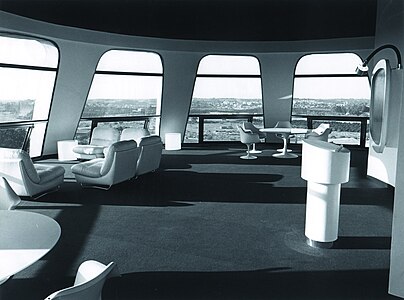Koffler accelerator

The Koffler particle accelerator of the Weizmann Institute of Science in Rehovot, Israel, was built in 1976. The building became a symbol of the institute. In 2011, astronomical observatory was opened on the top of the building.
Building[edit]
The accelerator building, designed by architect Moshe Harel in Formalist style, was completed in 1976. It has two towers, of 57 and 53 meters high, and an "egg-shaped structure", 22 by 14 meters in its widest points. It became a symbol of the Weizmann Institute of Science.[1][2] It was designed to have "a close resemblance to the original van de Graaff accelerators".[3] It is named after Murray Koffler, who was the first Chair of Weizmann Canada.[4] Now it serves as a conference hall.
Accelerator[edit]
The original accelerator installed in 1977 was a 14UD pelletron tandem accelerator, built by National Electrostatics Corp.[5][6][7]
Observatory[edit]
The Martin S. Kraar Observatory on top of the accelerator building was opened in 2011.[8] It is named after the philanthropist Martin S. Kraar.[9] The observatory is remotely-operated.[8] There are two telescopes there, the larger one is 41 cm, and the second one is 80 mm guide telescope, both connected to CCD cameras.[10]
Gallery[edit]
-
View from the conference room
References[edit]
- ^ "The Koffler Accelerator" (PDF). Weizmann Institute. Retrieved 14 January 2024.
- ^ "Cement (Photography, film)". Arts. Weizmann Institute. 2 May 2022. Retrieved 15 January 2024.
- ^ "Israel's new accelerator". Physics Bulletin. 28 (11): 505. November 1977. doi:10.1088/0031-9112/28/11/016. ISSN 0031-9112. Retrieved 15 January 2024.
- ^ Reed, Jon (19 December 2018). "A tribute to Murray Koffler". Weizmann Canada. Retrieved 14 January 2024.
- ^ Goldring, Gvirol (1973). "The new accelerator facility in rehovot". Nuclear Structure Physics. Springer: 254–266. doi:10.1007/3-540-06554-7_13. Retrieved 15 January 2024.
- ^ Goldring, G. (1977). "The Koffler accelerator in Rehovot". Revue de Physique Appliquée. 12 (10): 1309–1314. doi:10.1051/rphysap:0197700120100130900.
- ^ Berkovits, D; Paul, M; Ben-Dov, Y; Bordeanu, C; Ghelberg, S; Heber, O; Hass, M; Shahar, Y; Verri, G (1 August 2004). "Upgrading of the AMS facility at the Koffler 14UD Pelletron accelerator". Nuclear Instruments and Methods in Physics Research Section B: Beam Interactions with Materials and Atoms. 223–224: 161–167. doi:10.1016/j.nimb.2004.04.033. ISSN 0168-583X. Retrieved 14 January 2024.
- ^ a b "About the Observatory | The Martin S. Kraar Observatory". www.weizmann.ac.il. 1 September 2015. Retrieved 14 January 2024.
- ^ "Martin S. Kraar | The Martin S. Kraar Observatory". www.weizmann.ac.il. 1 September 2015. Retrieved 14 January 2024.
- ^ "A Dual-Purpose Observatory | ScienceBlogs". scienceblogs.com. Retrieved 14 January 2024.
Further reading[edit]
- Goldring, Gvirol; Hass, Michael; Paul, Michael (July 2004). "Laboratory Portrait: The Accelerator Laboratory at the Weizmann Institute". Nuclear Physics News. 14 (3): 5–13. doi:10.1080/10506890491034875. ISSN 1061-9127. Retrieved 15 January 2024.





